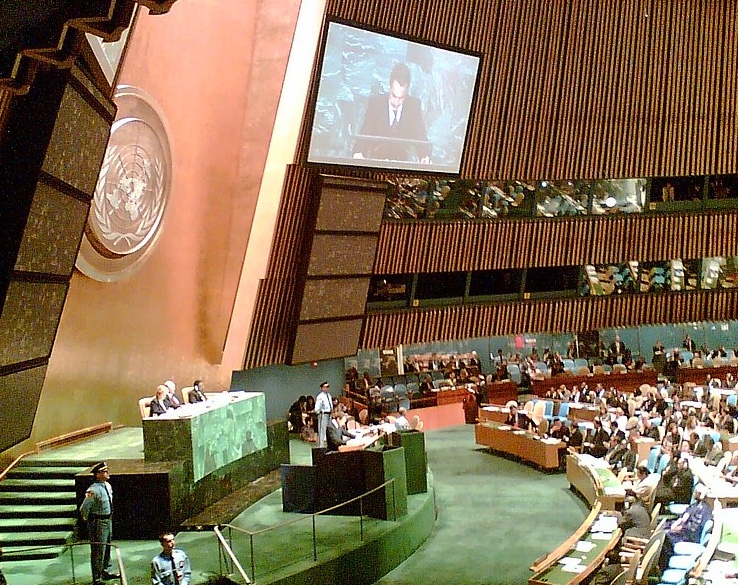Cooperation & Compliance Through International Law & Institutions

These bedrock principles–cooperation and compliance–are the foundation of this Signature Topic. Recent world events have put into question the efficacy of States' duty to cooperate. Compliance challenges permeate the international legal system, from peace and security to global public health, from human rights to trade and investment, from the deep seas to outer space. At a time when many of our existing institutions are being tested, what lessons can we learn about the nature and extent of cooperation and compliance in the international community? And how can these lessons learned be applied to mitigate current and future global calamities, including war, pandemics, climate change, mass displacement, food insecurity, natural disasters, terrorism, and the misuse of technology challenging the stability of the world?


Your co-chairs,

Emma Lindsay
Withersworldwide

Makane Moïse Mbengue
Université de Genève Faculty of Law

Blanca Montejo

Philippa Webb
King's College London, School of Law
- Emma Lindsay (co-chair), Withersworldwide
- Makane Mbengue (co-chair), Université de Genève Faculty of Law
- Blanca Montejo (co-chair), United Nations
- Philippa Webb (co-chair), King's College London, School of Law
- Mona Ali Khalil, MAK LAW/ Harvard Law School Program on International Law and Armed Conflict
- Ben Batros, Strategy for Humanity
- Kabir Duggal, Arnold & Porter Kaye Scholer LLP
- Hannah Garry, University of Southern California Gould School of Law
- Jacob Katz Cogan, University of Cincinnati College of Law
- Mark Pollack, Temple University College of Liberal Arts
- Nilufer Oral, National University of Singapore Centre for International Law
- Yuval Shany, Hebrew University of Jerusalem Federmann Cyber Security Research Center
CO-FACILITATORS' SUMMARY OF THE ASIL EVENT ON OCTOBER 24, 2023
The American Society of International Law (ASIL) Signature Topic for 2022-2024 entitled “Cooperation & Compliance Through International Law and Institutions” has been conceived, among other goals, to strengthen international cooperation and improve UN Member State compliance with a view to arriving at concrete recommendations to combat climate change, prevent nuclear proliferation and prevent pandemics.
ASIL wishes to thank the Permanents Missions of Kuwait and Austria for co-hosting the luncheon and interactive dialogue on 24 October 2023. We are also grateful to the three subject-matter experts, Gaukhar Mukhatzhanova, James Action and Joseph Cirincione who presented their proposals and concrete recommendations to the nearly 100 participating representatives of UN Member States as well as the IAEA and the ICRC. The proposals are summarized in the annexes hereto.
In addition, we are pleased to share some of the salient points raised in the rich discussion.
- Despite the entry into force of the Treaty on the Prohibition of Nuclear Weapons, the threats of nuclear catastrophe are increasing with attacks on peaceful nuclear facilities; threats of a new nuclear arms race between the nuclear weapon states; and potential nuclear proliferation among the non-nuclear weapon states.
- The International Court of Justice has been clear in that an obligation exists to pursue in good faith and bring to a conclusion the negotiations leading to nuclear disarmament in all its aspects under strict and effective international control.
- To ensure the success of the 2026 NPT Review Conference, NPT States Parties should negotiate a high-level political declaration reaffirming their commitment to the NPT and its goals as well as expressing a united position on the unacceptability of use and threats to use nuclear weapons (as proposed by Gaukhar Mukhatzhanova).
- To reduce the risk of a mistaken escalation, States should negotiate an agreement to notify one another in advance of all space launches; all test launches of ballistic or boost-glide missiles, and all test launches of missile defense interceptors and of target missiles (as proposed by James Acton).
- In order to increase security for peoples and States, every NWS should declare a “No First Use” doctrine; de-alert as many NWs as possible; reduce the number of NWs operationally deployed and decrease the total number of nuclear weapons (as proposed by Joseph Cirincione and the Elders).
In response to the proposals, several permanent representatives and deputy permanent representatives made statements emphasizing the following concerns:
- States are led to assume that nuclear weapons are the ultimate response to threats to their security.
- States should question that assumption and avoid escalation through positive and negative security assurances.
- A new security paradigm that includes women is necessary to combat nuclear proliferation.
- Existential threats are inter-related and should include the threats arising from Artificial Intelligence.
- Nuclear-Weapon Free Zones are important to international peace and security and should be extended.
ASIL seeks to bring UN Member States together with subject matter experts to enhance cooperation and compliance to avert the potentially catastrophic consequences of the existential threats. The event on averting nuclear catastrophe was the second of a series of events dedicated to the existential threats. ASIL will be holding the third event devoted to pandemics in Spring 2024 and possibly a fourth event on artificial intelligence in Fall 2024.
PROPOSAL BY GAUKHAR MUKHATZHANOVA
THE PROBLEM
Two consecutive review conferences of the Treaty on the Non-Proliferation of Nuclear Weapons (NPT) ended without adopting an outcome document. In both cases, States Parties were close to agreement (despite wide- spread dissatisfaction with the drafts), but consensus was broken by a small number or a single State over a specific issue. While the absence of a review conference outcome document is not the cause of problems in the international nonproliferation regime, repeated failures of the review conferences risk further hollowing out the review process and undermining the Treaty.
As the confrontation between Russia and the United States persists and competition between China and the United States intensifies, there is limited – if any – dialogue among some of the key actors in the regime on central issues, including arms control, prevention of use of nuclear weapons and implementation of past NPT review conference commitments. At the same time, we are witnessing increased salience and perceived value of nuclear weapons along with a heightened risk of their use. If the situation persists, and there is so far little reason to believe it will improve in the next couple of years, there is a high probability of another review conference ending without an agreement.
In the meantime, the non-nuclear-weapon States, who were prepared to compromise to adopt what they saw as fairly weak documents in 2015 and 2022, may not show the same restraint at the 2026 Review Conference. A meeting that ends in acrimony and a third review conference without an agreement would be damaging to the NPT regime and suggest reduced commitment to the Treaty, potentially undermining compliance with obligations and achievement of its goals.
THE PROPOSED SOLUTION.
NPT States Parties must find a way to reaffirm their commitment to the Treaty and demonstrate unity of understanding and purpose on key priorities and challenges facing the international nonproliferation and disarmament regime. During the current review cycle, NPT States Parties should negotiate a political (Ministerial) declaration reaffirming their commitment to the Treaty and achievement of its goals and expressing a united position on the unacceptability of use and threats to use nuclear weapons. The declaration should have high level support, preferably finalized before the 2026 Review Conference and adopted by the Conference. It should not replace the efforts to negotiate a comprehensive document with a review of implementation of past commitment and a defined set of targets for the future, on nuclear disarmament in particular. Rather, the declaration should be a high-level statement expressing unity on the key, overarching goals and values of the NPT regime.
THE BENEFITS AND BENEFICIARIES
NPT States Parties and the global community would benefit from not only reaffirmation of the importance of preventing the spread of nuclear weapons but, crucially, from a joint upholding of a nuclear taboo and commitment to prevent any use of nuclear weapons. Reaffirmation of commitment to the NPT and its goals would also underscore the importance of international law and norms, signal States Parties’ determination to comply with existing obligations and help create diplomatic space for a substantive outcome at future NPT review conferences.
PROPOSAL BY JAMES M. ACTON
THE PROBLEM
Missile tests, missile defense tests, or space launches could be mistaken for a nuclear or other attack, potentially resulting in nuclear escalation. Notifications can reduce the danger of such escalation (and also of the danger that escalation could result from preparations for a test or space launch being mistaken as preparations for an attack). Such risks are most acute among nuclear-armed states with a launch-under- attack capability (currently, Russia, the United States, and probably now China). However, as space technology, missile technology, and early-warning and space situational awareness systems spread, these risks could arise in other contexts. A patchwork of launch notifications regimes currently exist. These regimes include U.S.-Russian, Russian-Chinese, and Indian-Pakistani bilateral agreements, the Hague Code of Conduct, and safety warnings for aviation and shipping. However, involvement is far from universal. Moreover, these regimes suffer from various lacunas, including the absence of provisions for notifications about boost-glide missile tests, missile defense tests, or sub-orbital space launches (which can assist in the development of direct-ascent anti-satellite weapons).
THE PROPOSED SOLUTION
States could negotiate an agreement to notify one another of (i) all space launches, (ii) all test launches of ballistic or boost-glide missiles, and (iii) all test launches of missile defense interceptors and of target missiles (subject, in each case, to defined conditions). Ideally, such an agreement would be multilateral and legally binding. However, as an initial step, launch notification agreements could be politically binding and concluded on a bilateral or trilateral basis. Under such agreements, participating states would commit to providing (i) a pre-launch notification at least 24 hours before the start of a launch window; and (ii) a post-launch (or cancellation) notification within 48 hours of a launch. The agreement would not prohibit any kind of civilian or military activity.
In an earlier publication, my two co-authors and I present a detailed proposal for a trilateral (China-Russia- U.S.) agreement. This proposal includes detailed definitions, which need not be rehearsed here (except to note that “space launches” are defined to include sub-orbital launches). This earlier proposal could be applied multilaterally with perhaps just two changes:
- First, instead of exchanging launch notifications directly, states would submit them to a coordinator, which would then distribute them to all participants. This coordinator could be the United Nations, another international organization, or a participating state. In any case, the distribution of notifications should be automatic and, after being developed, an appropriate IT system would require minimal resources.
- Second, states could consider reducing the range and speed thresholds at which reporting requirements are triggered, given that various pairs of states with antagonistic relations are located close to one another.
THE BENEFITS AND BENEFICIARIES
The primary benefit of launch notifications would be reducing the risk of nuclear escalation from a misinterpreted warning. This risk is not purely theoretical. In 1995, for example, Russia briefly mistook a sounding rocket launched from the coast of Norway as a U.S. sea-launched ballistic missile; the resulting cascade of warnings reached President Yeltsin, who activated his “nuclear briefcase.” Given the potentially global consequences of a nuclear detonation, all states would benefit from reducing escalation risks. More generally, the transparency and predictability facilitated by launch notifications would benefit any state with concerns about foreign space, ballistic missile, boost-glide missile, or missile defense programs. In short, as tensions between nuclear-armed states rise and as more states develop missile and early-warning technology, launch notifications could spare humanity a nuclear catastrophe borne out of misinterpretation.
PROPOSAL BY JOSEPH CIRINCIONE
THE PROBLEM
Dangers from nuclear weapons are increasing. Government and active public support for reducing and eliminating those weapons is decreasing. Growing tensions between nuclear-armed states thwart the continuation of arms control and disarmament efforts that have proven successful in the past. A new nuclear arms race has begun. A conflict involving a nuclear-armed state could escalate to nuclear use, potentially large-scale nuclear use. Any such use would be catastrophic. The explosion of even a small portion of the over 12,000 nuclear weapons held by nine nations could kill billions of people.
THE PROPOSED SOLUTION
In order to improve cooperation and compliance with obligations under existing treaties and agreements, diplomats, experts and advocates can undertake actions that increase awareness of the nuclear threats and present concrete steps to reduce these threats.
- At a minimum, we must work to increase global attention of the nuclear risks. We cannot cede ground to those who believe nuclear weapons offer security, prestige and profit.
- We must defend the existing nuclear guardrails. Protect and strengthen the international non- proliferation regime; stop the destructions of the remaining arms control agreements.
- We must encourage global fora, national governments and large non-governmental organizations to include nuclear dangers in their work to protect the planet and its populations.
- While embracing the ultimate goal of the elimination of nuclear weapons, we must promote nuclear risk reduction measures.
I have advised the Elders, an independent group of former international and national leaders founded by Nelson Mandala in 2007 and now chaired by former Irish President Mary Robinson. They have recently published a policy paper on nuclear weapons -- a practical plan for nuclear risk reduction that they call “The Four D’s” including:
- Doctrine: Every nuclear-armed state should declare a “No First Use” policy
- De-Alerting: Take as many weapons as possible off the current high-alert status
- Deployment: Reduce the number of weapons operationally deployed
- Decrease: Reduce the total number of nuclear weapons.
THE BENEFITS AND BENEFICIARIES
All nations and peoples would benefit from these plans. While working for more permanent solutions, like the Treaty on the Prohibition of Nuclear Weapons, which entered into force in January 2021, and pressing for renewed arms reduction talks between the U.S. and Russia, these practical steps offer policies that can be implemented now.
Some can be done unilaterally. Each reduces the risk of nuclear use. Coupled with efforts to preserve the current non-proliferation regime, including achieving the entry into force of the Comprehensive Test Ban Treaty, these steps can measurably increase the security of peoples and States world-wide.

CO-FACILITATORS' SUMMARY OF EVENT ON (May 31, 2023)
Achieving Tangible Cooperation and Compliance to Avert Climate Catastrophe
Addressing the existential threats of the 21st century including climate change will play a crucial role in the lead-up to the COP 28 in December 2023 and the Summit of the Future in 2024. The American Society of International Law (ASIL) Signature Topic for 2022-2024 entitled “Cooperation & Compliance Through International Law and Institutions” has been conceived , among other goals, to strengthen international cooperation and improve UN Member State compliance with a view to arriving at concrete recommendations to combat climate change, prevent nuclear proliferation and prevent pandemics.
ASIL wishes to thank the Permanents Missions of Kenya and Saint Vincent and the Grenadines for co-hosting the 31 May 2024 event. We are also grateful to the two subject-matter experts, Dr. Achala Abeysinghe and Dr. Scott Barrett, who presented their proposals and concrete recommendations to the participating member States. The proposals are summarized in the annexes hereto.
In addition, we are pleased to share with you some of the salient points raised in the rich discussion.
The latest IPCC report warns that there “is a rapidly closing window of opportunity to secure a liveable and sustainable future for all.” To avoid climate catastrophe, we must ensure compliance and cooperation to achieve these imperatives and aspirations. We must save multilateralism in order to save humanity.
- Climate catastrophe has faces and places. The real reason climate action is not urgent and ambitious enough is because those faces and places are poor. The climate catastrophe, like the pandemic we have just experienced, or the destructive wars of the past that swept the world, shall eventually visit even the most gilded and protected among us. In our endeavor to achieve green industrialisation, we need reciprocal commitment from industrialised nations. Solidarity in climate action is not just a moral obligation but a necessity for our collective survival.
- Despite 30 years of climate negotiations, concentrations of CO2 are much higher today than at the start of the negotiations. While the Paris Agreement has had a positive impact, the world is not moving fast enough to reach the target of temperature limit rise to 1.5 degree Celsius. If we want the UN and multilateralism to survive, we need to do better. A different approach is necessary.
- Rather than waiting for the COP 28 to confirm failure, action can be taken now. As proposed by Dr. Abeysinghe, the UN can play a dual role. First, led by the Secretary-General, the UN can act as a convenor; a global norm-setter; a facilitator of international financing and a driver of inter-sectoral collaboration. Secondly, the UN can promote a new framing of mitigation, emission reduction and adaptation to minimize loss and damage - both economic and non-economic - within a global just transition framework.
- Rather than proceeding with the “emission reduction paradigm”, treaty making should be oriented to creating the necessary incentives toward collective action. As proposed by Dr. Barrett, climate treaties should be structured around three main guiding principles. First, treaties should focus on sectors and technology, not a whole of economy approach. Secondly, treaties should include trade provisions incentivizing behavioral change and the benefits of collective R&D. Thirdly, treaties should aim at critical mass thinking, thereby achieving behavior to effectively tip and have an impact.
- In response to the proposals, several Member States made statements emphasizing the following imperatives:
- Enlarging self-interest to include a concept of global solidarity;
- Ensuring fair access to the technology necessary to combat climate change;
- Promoting fair trade and financing to facilitate a just transition;
- Acknowledging the disparate responsibilities and impact of climate change – largest emitters suffering the least and the lowest emitters suffering the most;
- Strengthening monitoring and enforcement mechanisms in the existing legal instruments;
- Resorting to judicial action, including the General Assembly’s current request for an advisory opinion from the International Court of Justice, to reinforce and accelerate climate action;
- Requiring private sector actors (particularly the fossil fuel industry) to act in accordance with multilateral norms and national obligations.
The event on climate change was the first of a series of three public-facing events dedicated to the existential threats. ASIL will be holding the second event devoted to nuclear proliferation in Fall 2023 and the third on pandemics in Spring 2024.
ASIL seeks to bring UN Member States together with subject matter experts to enhance cooperation and compliance to avert the potentially catastrophic consequences of the three existential threats.
A Proposal to Reinvigorate and Realign the Global ClimateRegime for a Just Transition
Dr. Achala Abeysinghe, Director and Head of Programs for Asia, Global Green Growth Institute (GGGI)
Two of the most crucial provisions of the Paris Agreement are the 1.5C target and the loss and damage provision. Since the Paris Agreement came into force, it has had several positive impacts. Most States have submitted their enhanced NDCs; adopted long term energy policies and electric vehicle strategies; introduced carbon taxes and entered into strong public private partnerships.
Nonetheless, the world is not moving fast enough to keep temperature limit below the 1.5 degree target. The world’s dependance on coal has actually grown and the renewable energy share is very low. The necessary investments are not coming in and technological innovation is slow. In the meantime, so many countries, communities and eco systems are facing irreversible climate impacts.
As UNFCCC COP28 approaches, we do not need to wait for the first-ever Global Stocktake to recognize the significant gap between current progress and the desired trajectory. Most countries are falling short of their NDCs and their efforts are not equal to the imperatives of the crisis.
The Paris Agreement is premised on the logic of encouraging (rather than imposing) actions aligned with its goals. There is no enforcement mechanism to hold States accountable. Without immediate emissions cuts and scaled-up finance, warming will worsen and more people will be pushed into extreme poverty. As the IPCC has explained, when carried out in a just manner, emissions reductions can also eradicate extreme poverty, expand energy access, and improve living standards.
My first proposal relies on the UN playing its role as a convenor; as a global norm-setter; as a facilitator of international financing and as a driver of inter-sectoral collaboration. The UN Secretary General could convene Heads of State to align policy towards a global just transition framework to support countries to effectively implement and be accountable for their NDCs and establish a new UN programme under UNFCCC auspices which could increase climate ambition to achieve 1.5C target by:
- Helping States enhance the quality of their NDCs, attract investments and overcome obstacles;
- Developping an understanding of fair shares as well as operational templates for just transition;
- Establishing guidelines focusing on people and eco systems including social protection measures to promote gender justice; protect local industry and develop new employment niches;
- Hosting events to unlock investment potential; encourage technological innovation; highlight developments such as green hydrogen and de-risk growth profiles for renewable energy;
- Setting up funding pots similar to those committed for Vietnam, Indonesia, and South Africa.
My second proposal is for the UN to promote a new framing of mitigation, emission reduction and adaptation to minimize loss and damage (L&D) - both economic and non-economic - within a global just transition framework. It is crucial to prioritize action, good governance, and financial support by:
- Amplifying the need for international and regional cooperation and solidarity for Global South;
- Diversifying funding sources for effective management and mitigation of L&D and improving fitness for purpose of the GCF and GEF as well as the Adaptation Fund and the LDC Fund;
- Inviting the IPCC to produce a special report on L&D under various warming scenarios, including economic and social costs, to inform future decisions on L&D no later than COP30;
- Framing L&D together with ambition and resilience in a just transition process in upcoming COP 28;
- Appointing a special climate envoy to coordinate L&D in the UNFCCC, UNOHRLLS and other processes.
The transition to net zero in the world should not be just a technical and financial matter- it must also be about individuals and communities – their lives, well-being, and aspirations. The transition should be a just and collective endeavor, driven by the strong principle that green growth is not just about reducing emissions, but also about improving the quality of life for all, leaving no one behind.
A New Approach to Climate Negotiations
Dr. Scott Barrett, Columbia University and London School of Economics
More diplomatic effort has been devoted to climate change than any other issue in world history. And, yet, despite thirty years of negotiations, three treaties, and 27 Conferences of the Parties, CO2 concentrations are much higher now than they were at the start of negotiations.
If we want people to support the UN and multilateralism, we need to do better.
Multilateralism has succeeded in the past. The Montreal Protocol is expected to restore the ozone layer to its pre-1980 level by around 2050-2060. A treaty known as MARPOL has prevented releases of oil by tankers into the seas. These two UN treaties have worked.
Why the difference? Climate change is a harder problem, but there is another reason. The climate treaties ask countries to reduce emissions. The other treaties are designed differently. Asking countries to limit their emissions plays into the hands of the “prisoners’ dilemma.” A country that reduces its emissions pays the full cost, but shares the benefits of its actions with other countries, whether or not these others reciprocate by reducing their emissions. Worse, because of trade linkages, when one country limits emissions, prices change, causing other countries to increase their emissions.
Montreal also asks countries to reduce emissions. However, the countries that participate in Montreal are forbidden from trading with non-participating countries in CFCs and products containing CFCs.
Because of this linkage to trade, as more countries participate, more of the others want to participate. Trade linkage turns the prisoners’ dilemma into a “tipping” game.
MARPOL is a little different. MARPOL sets a new technical standard for oil tankers. Countries that want to protect their coasts, restrict port access to ships adopting the new standard. As more ports restrict entry, more ships want to meet the standard; and as more ships meet the standard, more ports want to restrict entry. The new standard creates a positive-feedback; again, a tipping game.
Possibly the best climate agreement is the Kigali Amendment to the Montreal Protocol, which phases down HFCs, a greenhouse gas. Kigali should work; like Montreal, Kigali incorporates a trade measure.
We need more treaties like this. Smelting of aluminum results in emissions of CO2 and PFCs, another greenhouse gas. Replacing the carbon anode used today with an inert anode can eliminate these process emissions. An aluminum treaty should require that parties both switch to the inert anode and import aluminum only from other parties to this agreement. The result, once again: tipping.
Mission Innovation, a coalition of 22 countries, funds R&D so as to lower the cost of reducing CO2 emissions in particular sectors, making take-up of new fuels and technologies more attractive for all countries. For shipping, Mission Innovation is identifying the best substitute for heavy fuel oil, undertaking R&D to lower its costs, and making the new fuel available at the world’s ten largest ports.
Ten ports may not be enough to tip behavior, but the logic behind this approach is right. Enough countries must switch in order for others to want to switch. We need more treaties like this—treaties that: (1) focus on sectors and technology- and fuel-switching, (2) promote trade linkages and collective R&D, and (3) achieve critical mass, causing behavior to tip.
CO-FACILITATORS' SUMMARY OF DISCUSSION (October 24, 2022)
Climate Change, Nuclear Proliferation and Pandemics: Challenges and Opportunities to Improve Cooperation and Compliance
The American Society of International Law (ASIL) wishes to thank the International Peace Institute (IPI) and the Permanent Mission of Austria for co-sponsoring the 24 October "UN Day" roundtable on "Climate Change, Nuclear Proliferation and Pandemics: Challenges and Opportunities to Improve Cooperation and Compliance". We are also grateful to the Ambassadors, legal advisers and subject-matter experts who participated and contributed to the rich discussion.
Addressing the existential threats of the 21st century is central to the survival of humanity and will play a crucial role in the lead-up to the Summit of the Future in 2024. The ASIL Signature Topic for 2022-2024 entitled "Cooperation & Compliance Through International Law and Institutions" is therefore timely and can help the UN community to discuss how to improve and strengthen cooperation and compliance with a view to arriving at concrete recommendations to combat climate change, prevent and defeat pandemics and prevent nuclear proliferation. We are pleased to share with you some of the salient points and proposals raised in the discussion.
- The Covid-19 Pandemic, the alarming reports of the accelerating climate crisis, and the attacks on nuclear facilities and threats to use nuclear weapons reveal the vulnerability of the moment and the urgency of addressing the three existential threats at the same time.
- The Paris Agreement has achieved certain advances but COP after COP we see the objective of limiting global warming to 1.5 degree Celsius ever elusive. The COVID-19 pandemic has exposed the weakness of the post-1945 institutions' ability to respond to the needs of the time. Despite the Non-Proliferation Treaty's triple package of balancing non-proliferation, peaceful use of nuclear science and energy, and a good faith obligation towards nuclear disarmament, in recent years, these components have been critically eroded and the future of the NPT put into question.
- While there are rules and norms in international law to deal with some of these threats, cooperation and compliance remains a challenge; the lack of implementation and enforcement as well as double standards weaken the credibility and viability of the existing legal framework leading to a crisis of confidence in the UN and in multilateralism. To address compliance, we must discuss mechanisms to increase the political and legal costs of non-compliance. Effective deterrence needs to be part of the strategy.
- The UN Member States' inability to respond coherently to COVID-19; their inability to work within the UN structures to end the nuclear threats or to strengthen non-proliferation as well as the States parties to the Paris Agreement's failure to slow global warming to the necessary degree has also revealed a lack of respect for international law and a diminishing commitment to international institutions. Our initiative aims to incentivize the fulfillment of the duty to cooperate and the duty to comply with existing legal obligations and to introduce disincentives that change the cost-benefit analysis for non-cooperation and non-compliance.
- Time is not on our side and concrete measures should be explored and adopted. We must identify strategies to translate existing norms into prompt and tangible action to combat existential threats. Cooperation and coordination between decision-makers as "norm setters" and national authorities as "implementers" is essential.
- Diagnosing and identifying the blocks to the advancement of international action against these threats is essential. Setting boundaries to political discretion and identifying what should be clearly binding and incontestable is key to ensure that the goals remain achievable within our lifetimes. Actors other than States have a crucial role to play in achieving these goals. Engaging them is a necessary part of the strategy.
During the discussion, several interesting proposals were made including the following actionable measures:
- Establishing automaticity of consequences for violations of international law to supplement and support the existing legal instruments;
- Introducing soft law and guidance instruments to reinforce the existing legal frameworks, strengthen national implementation and ensure greater compliance;
- Increasing legislative and technological assistance;
- Setting up monitoring and verification mechanisms in support of existing legal instruments and identifying viable means to enhance international enforcement;
- Inviting non-State stakeholders, including potential private sector partners, to the intergovernmental deliberations and actively
ASIL is planning a series of three public facing events at UN Headquarters in New York in 2023 and 2024 devoted to climate change (Spring 2023), non-proliferation (Fall 2023) and pandemics (Spring 2024) bringing UN Member States together with subject matter experts to enhance cooperation and compliance to avert the potentially catastrophic consequences of the three existential threats.
